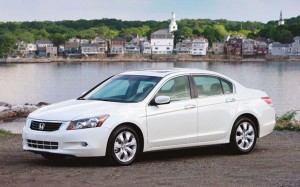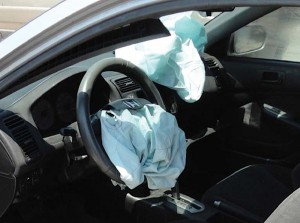
The 2008 Honda Accord is part of another recall for faulty airbags. The maker is recalling 300,000 of the vehicles from 2008 and 2009.
If you own a Honda Accord, don’t slam that door too hard. The Japanese automaker is recalling 300,000 of the cars from 2008 and 2009 because the side-impact airbags may deploy if the door is “forcefully slammed.”
There have been 19 complaints about the issue, which the maker blamed on an incorrect sensor calibration. The problem affects both the air curtains, which are in the roof above the side windows and provide head protection, and airbags in the side of the seat that protect the torso.
The National Highway Traffic Safety Administration started investigating the problem last year due to the complaints, which included several instances of the automaker refusing to pay for the repair.
However, Honda officials are now reimbursing owners as part of the problem fix, which is a simple software update, in this case the resolution is quick and uncomplicated, but it’s just another airbag problem that has plagued Honda.

Honda has the strongest ties to Takata and has more than 5 million vehicles involved in the current recall.
Honda is the automaker most acutely affected by the ongoing and ever-expanding Takata airbag inflator problem, recalling more than 5 million vehicles due to the defect. While the latest issue isn’t part of Takata recall, it’s just one more incident casting doubt about technologies aimed at saving lives are often putting us in peril.
The current airbag problem began with Takata. The company had already forced several automakers to recall hundreds of thousands of vehicles for a different issue several years ago, but it wasn’t the tidal wave that the current issue has produced.
More than 19 million vehicles in the U.S. will be recalled due to Takata-produced airbags that may explode when inflating, spewing pieces of metal shrapnel into vehicle’s cabin potentially injuring or even killing the occupants.
The problem has been blamed for eight deaths and scores of injuries. Dozens of lawsuits have been filed related to the problem as the 11 automakers using the airbags, Takata and federal safety officials have scrambled to figure why.
(Feds mull expansion of Takata airbag recall. For more, Click Here.)
Adding to the chaos is the fact that Takata and the other suppliers building the replacement kits will need nearly two years to produce all of the new parts to complete the recalls.
Now it appears that there are problems with more than just the driver and passenger front airbags from the supplier, some side impact bags in General Motors and Volkswagen vehicles are may react the same way.
Mark Rosekind, who heads up the National Highway Traffic Safety Administration, said he will make a decision about expanding the recall by Thanksgiving.
“That’s part of what the investigation is looking at — whether or not we have to go further,” Rosekind said recently.
It comes at the least opportune time for automakers that are trying to introduce – and market – vehicles with several complicated advancements designed to make driving safer. However, motorist are now wondering how makers can get autonomous vehicles right if something much less complicated like an airbag is faulty?
(Click Here for details about growing consumer dissatisfaction with vehicle recalls.)
Take a step back from the Takata saga, and one wonders how anyone buying a new vehicle, which is happening at a record pace this year, has any faith in what they’re plunking down hard-earned cash to buy.
Last year, the industry set a new record for recall. Actually, it didn’t merely “set” the new record, it obliterated the previous one by double. More than 60 million vehicles were subject to some form of action and the mix of the Takata problem combined with tougher enforcement of standards makes it appear that the auto industry will set another record for a second consecutive year.
A new study finds that Americans are beginning to get tired of dealing with the stream of recalls. Despite an overall increase in quality, the epidemic of recalls that reached an all-time record of 64 million vehicles last year has left Americans less happy with the cars and trucks they drive than at any time in more than a decade. And with the spate of new recalls showing little sign of slowing, the situation isn’t likely to improve anytime soon.
“While it is true that all cars are now much better than they were 10 to 20 years ago, it is alarming that so many of them have quality problems,” said Claes Fornell, chairman and found of the American Consumer Satisfaction Index.
(To see more about Honda’s efforts to get warn airbag owners to fix their vehicles, Click Here.)
According to the 2015 American Consumer Satisfaction Index, this year’s automobile satisfaction score slipped by nearly 4%, to 79 out of a possible 100. That’s the lowest it has dipped to since 2004.
